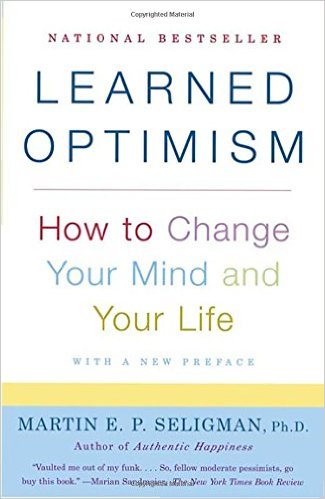Learned Optimism Summary

4 min read ⌚
 How to Change Your Mind and Your Life
How to Change Your Mind and Your Life
Optimism is a choice, not a method and it works for everybody. By believing in a positive future, you are one step closer to happiness and peace.
Be the creator of your destiny, don’t allow harmful forces to your Optimism.
In this book summary, we briefly present some key features you should be familiar with in order to drive this point further.
Who Should Read “Learned Optimism”? And Why?
The world evolved, and it is still evolving. Growing up doesn’t only include the physical aspect. Many of us have struggled to overcome the severe psychological issues that the society has enforced on us over the years. These difficulties according to Martin, are only the consequences of your life-attitude.
All the contributions are attributed to motivators and writers who encourage each and every one to take a step towards freedom and optimism. It is not easy for some people because the negative sensations are so deeply rooted in our hearts.
Only by understanding the true meaning of confidence a person would be able to experience life in and all its pleasures. This book is intended for all the individuals in the world, not only for those who are optimistic by nature, but especially for individuals who suffer from their thoughts.
About Martin E.P. Seligman
 Martin E.P. Seligman is an American born psychology professor with a Ph.D. obtained at the University of Pennsylvania, writer, educator and a former president of the American PsychologicalAssociation. Martin was born in Albany, New York 1942.
Martin E.P. Seligman is an American born psychology professor with a Ph.D. obtained at the University of Pennsylvania, writer, educator and a former president of the American PsychologicalAssociation. Martin was born in Albany, New York 1942.
He grew up in the “Big Apple” where Seligman firstly encountered the real benefits of optimism. In 1964, he received a bachelor degree from Princeton University – New Jersey.
His writing career started when Martin began to comprehend and implement the theory of positive thinking and optimism. As an author of several books, he wrote: The Optimistic Child; Child’s Play; Learned Optimism; and Authentic Happiness.
“Learned Optimism Summary”
Martin E.P. Seligman refers to three particular modern forces, which are responsible for causing an epidemic of anxiety, and depression in wealthy, independent and prosperous America:
1) The lack of unity by intensely focusing on individual characteristics;
2) Social media boom, and the absence of real relations;
3) People’s priority on developing self-esteem.
Martin discovered interesting and alarming societal inner priorities which emerged from one’s self. He interprets these priorities or aspects as some products or fruits of success and rarely the cause of it.
The research led to an unpleasant revelation: People who disregarded other people’s feelings and believed that unwarranted high self-regard is a good thing were more prone to violence, criminal behavior, and even murder.
Rather than, putting too much energy into education and pushing for personal success; parents and teachers should be focused on teaching and implementing optimism.
What is optimism?
Optimism is not a method for disposable use; it is a concept, an evolved mindset capable of seeing the best in any situation.
The inner voice inside our heads is a tricky business. This voice can either be your best friend or your worst enemy. It all depends on how you perceive different life circumstances and unpleasant situations. You surely have found yourself in a pessimistic funk and supported by helplessness and weakness.
Why should you develop a more optimistic explanatory style that can lead you to something better?
The pessimists see with the eyes of personhood, while optimists have a broader perspective.
For instance: Setbacks are perpetual for pessimists, while for optimists they are simply life-lessons. The main thing is to be able to see beyond the curtain and stop taking life so seriously. Optimists have a different attitude towards problems, for them, they are just temporary.
However, if a downer takes the driving seat of life, you can immediately feel the negative energy that emerges out of them. They do not take actions; they are just whining and complaining. If you wish to become a self-fulfilling prophecy you have to transform yourself.
If there is a talent deficiency – it all comes down to how individuals approach life.
The winner is the risk-taker while the loser will always have a fear to tread. The author has good news; you can learn optimism by resisting those negative sensations that arise on a daily basis. Some people may think that optimism is positive thinking, but they are not quite right.
Optimism is life; optimism is not a feeling, it is a path that everyone should take. Martin offers its readers useful cognitive techniques designed to tweak your mindset by giving you the real sense of optimism.
Key Lessons from “Learned Optimism”
-
- Create a balanced life
-
- How to deal with defeats and failures
- Optimist cares for the community
Create a balanced life
One unique gift is hidden within the pessimistic approach – stubbornness. From time to time, you have certainly caught yourself thinking that away. Pessimists speak and portray different situations or circumstances with an exquisite accuracy. Being too optimistic it is not recommended either since that would be less realistic.
How to deal with defeats and failures
It is okay to fail in life, but the difference lies in the reaction. The resilient people react differently than the pessimistic ones who fall into long-lasting depression. How to cope with failures? Is it permanent or just temporary thing? It is all up to you, set your future goals, motivate yourself and go on.
Optimist cares for the community
There are Doers and Delayers. The Optimists tend to take better care of themselves and the community overall. It is hard, maybe even impossible to break their spirit, which keeps them motivated when it comes to practicing and sticking to strict diets.
People with bad habits are more prone to experience depression as a result of the negative aura that surrounds them.
Like this summary? We’d Like to invite you to download our free 12 min app, for more amazing summaries and audiobooks.
“Learned Optimism” Quotes
Curing the negatives does not produce the positives. Share on X The genius of evolution lies in the dynamic tension between optimism and pessimism continually correcting each other. Share on X Pessimistic prophecies are self-fulfilling. Share on X Depression, I have argued, stems partly from an overcommitment to the self and an under-commitment to the common good. Share on X First, you learn to recognize the automatic thoughts flitting through your consciousness at the times you feel worst. Share on XOur Critical Review
This book lacks a bit of uniqueness due to the fact that these days we have plenty of materials sharing the same message. Nonetheless, we believe that it still has a lot to offer and you should exploit the given opportunity.








